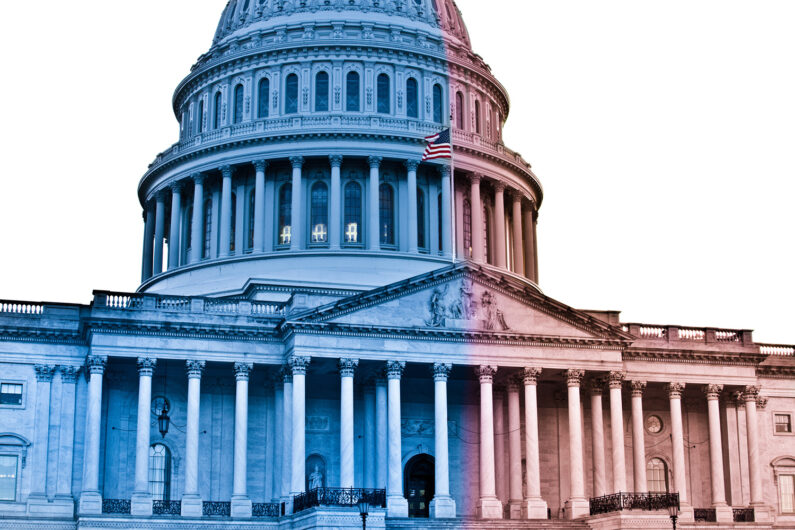Ways to strengthen democracy, as determined by Stanford-led ‘mega study’
A Stanford-led project has identified a set of strategies to counter anti-democratic attitudes and reduce partisan animosity.
American democracy is at risk, Stanford scholars and others have warned.

A Stanford-led project has identified a number of strategies that are effective in reducing Americans’ support for undemocratic practices and candidates. (Image credit: Getty Images)
Many studies have found anti-democratic attitudes and support for partisan violence are at concerning levels among the American public, partisan animosity is growing, and Americans are willing to compromise democratic principles for partisan gain.
Stanford sociologist Robb Willer is among those worried about what these attitudes mean for the stability of democracy in the U.S.
To counter some of the risks Willer and many Americans are troubled by, Willer launched a massive, three-year project to test a variety of simple and scalable ways to counter anti-democratic beliefs that threaten the country’s political future.
Now, results from their experiment, conducted on a national sample of over 32,000 American partisans, have been released in a working paper and as a website, Strengthening Democracy Challenge.
Overall, Willer and his team found a set of effective strategies that reduced support for undemocratic practices, candidates, and partisan violence. Partisan animosity was also lowered by many of the interventions they tested. The researchers also found that the strategies they identified often impacted other outcomes, such as opposition to bipartisan cooperation and biased perceptions of politicized facts.
“This is important because, if a country has free and fair elections, the public provides a critical check against undemocratic candidates,” said Willer, a professor of sociology and director of the Polarization and Social Change Lab. “Thus, an important way to stop politicians from engaging in undemocratic practices is to somehow mobilize voters to oppose them, and the threat of that can help to deter these actions in the first place.”
Crowdsourcing ways to reduce anti-democratic attitudes
The study, which launched in July 2021, was partly motivated by the research team’s concerns about anti-democratic trends emerging in the U.S. – particularly bogus claims about election fraud that eventually culminated in former President Donald Trump’s allegation that the U.S. 2020 presidential election was stolen from him – and their implications for democratic governance.
“One of the most concerning trends we see right now is widespread skepticism and even denial of the results of the 2020 election,” said Willer, who is also co-director of the Center on Philanthropy and Civil Society in the School of Humanities and Sciences at Stanford University. “Just as concerning to me is that among the large portion of Republicans who do not believe the 2020 election is rigged, many – perhaps the majority – are still likely to vote for the many politicians who are not speaking out against these unsupported suspicions.”
Willer wondered if the social sciences could offer insight into scalable ways to address anti-democratic attitudes more broadly.
From there, the Strengthening Democracy Challenge was established.
The team put out a broad call asking for suggestions from both the academic research community and those working on these problems in non-profits and activist groups. They asked that ideas – or “interventions” – be brief and something participants could engage with online.
Willer and his team were inundated with responses from scholars around the world. “The challenge brought together some of the best ideas that social scientists and practitioners have to offer, allowing us to choose the most promising 25 interventions from a total of 252 submissions that we received,” said Jan Voelkel, a PhD student in sociology and one of the project’s lead researchers. In collaboration with an advisory board of leading scholars and practitioners in the field, the project’s leads chose a variety of ideas, including videos, a chatbot quiz, and writing prompts.
This large scope allowed the scholars to compare different interventions directly against each other and to investigate how outcomes they studied are, or are not, connected – for example, they found that interventions were most effective in reducing partisan animosity, but that partisan animosity is unrelated to most of their measures of anti-democratic attitudes, with the exception of support for undemocratic candidates.
The scholars were also able to identify which interventions tended to be most successful.
For example, those that most decreased partisan animosity tended to spotlight relatable and sympathetic individuals with opposing political viewpoints and/or cultivate a feeling of a shared cross-partisan identity, the team noted.
The team also conducted a follow-up study with roughly half the study participants to see whether the interventions had any enduring effects. They found the interventions were often durable over time in reducing partisan animosity, but effects on anti-democratic attitudes were more limited. One possible explanation is that interventions may need to be administered repeatedly, or combined, to have more durable effects. “We’re really testing interventions that represent strategies for effectively intervening. In applying the knowledge in the field, you’d want to strengthen these interventions,” Willer said.
Reducing support for undemocratic practices
One of the top-performing interventions was put forward by Stanford PhD candidate Katherine Clayton and Michael Tomz, the William Bennett Munro Professor of Political Science at Stanford.
Their intervention, Appealing to Fear of Democratic Collapse, is designed to show the public the catastrophic consequences of democratic breakdown.
“There’s a lot of research in psychology and political science suggesting that emotions can shape political attitudes and behavior,” said Clayton. “We were interested in whether we could harness one powerful emotion – fear – to reinforce citizens’ commitments to democracy. We think that part of the reason that citizens may not always profess their commitments to democratic values is that it is difficult for them to envision what it would look like if democracy failed.”
Participants watched a video showing images of politically motivated chaos and violence that followed the democratic collapse in several countries – Zimbabwe, Venezuela, Turkey, and Russia. Slides briefly explained what rulers did to stay in power, such as refusing to recognize election results, prosecuting critical journalists, and jailing political rivals. Ominous music also played in the background. The video closed with a foreboding question “Could it happen here?” and cut to footage of the mob that stormed the U.S. Capitol on Jan. 6.
“We decided to juxtapose footage of unrest in failed democratic states against the Capitol insurrection to suggest that the United States could be headed down a very dark and scary path if citizens do not affirm commitments to democracy,” Clayton said.
Following the three and half-minute film, participants learned how they could defend democratic values, such as respecting the separation of powers and criticizing politically charged violence.
Willer and his team found that Clayton and Tomz’s intervention decreased partisan animosity and reduced support for both undemocratic candidates. However, there was an uptick in support for political violence – an effect the scholars attributed to Republican participants, many of whom now perceive the attack on Capitol Hill as a legitimate protest.
Another intervention the project tested, Beliefs About Political Empathy: A Tool for Reducing Partisan Animosity and Political Violence, was developed by Stanford psychology scholars Luiza Almeida Santos and Jamil Zaki and intended to show the value of empathy in political discourse. In their intervention, participants learned about the benefits of empathizing with people from opposing political parties and were asked to reflect on how empathy can be useful in politics.
Here too the scholars found that the intervention significantly reduced Democrats’ and Republicans’ reported partisan animosity.
Next steps
Willer and Voelkel hope that the project’s results will be a useful resource for organizations, political leaders, and social media platforms looking to foster a healthy democratic environment.
“The interventions form a promising toolbox that can be applied to reduce many problematic attitudes,” Voelkel said. “For example, our research finds that correcting misperceptions of rival partisans can have powerful effects. We hope that social media companies will distribute content that helps correct the widespread misperceptions American partisans hold about each other.”
The team is working now with organizations to evaluate the effects of these interventions in the field.
The research team included Willer, Voelkel, Chrystal Redekopp, and Joe Mernyk (Stanford University); Nicholas Stagnaro and David Rand (MIT); James Chu (Columbia University); James Druckman (Northwestern University); and Sophia Pink (University of Pennsylvania).
Funding for this project came from the Civic Health Project, Fetzer Institute, the Stanford Center on Philanthropy and Civil Society, Stanford Impact Labs, the Institute for Policy Research at Northwestern University, the United States Department of the Navy Office of Naval Research, the TDF Foundation, and Ford Motor Company Center for Global Citizenship. This work is supported under a Stanford Interdisciplinary Graduate Fellowship.

